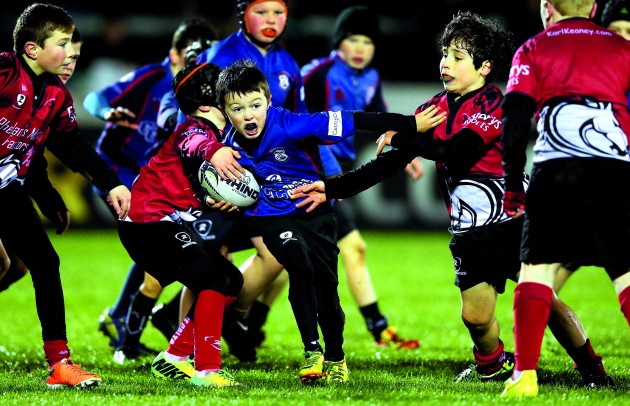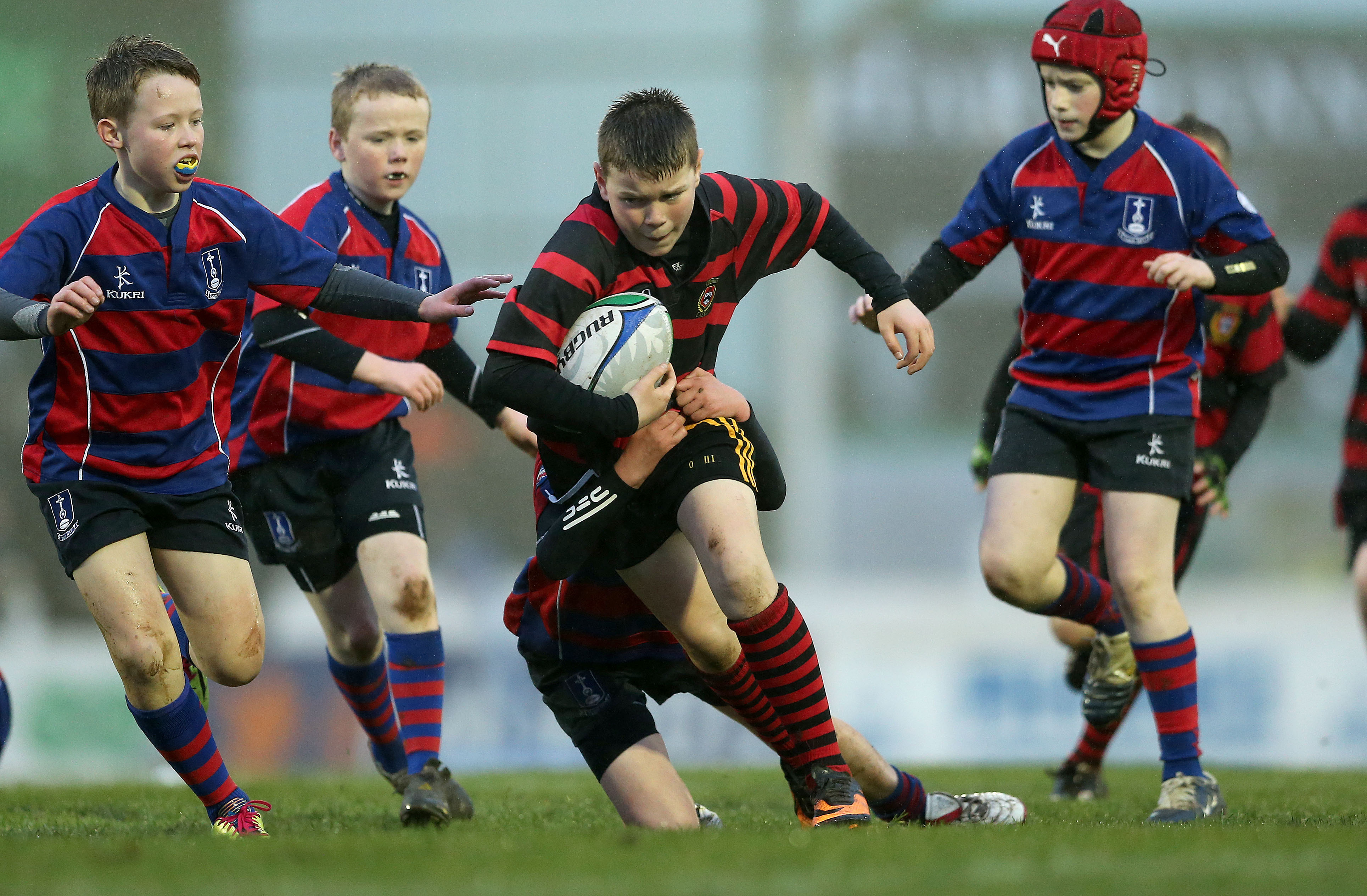It's a question sure to polarise parents and coaches up and down the country. Is winning all that important, or is taking part the most beneficial aspect for the next generation?
The dropout rate of young adult players has long exercised the minds of rugby’s rulers. Faced by falling participation rates in recent years, the RFU commissioned research into new ways to teach the younger age groups – with the emphasis on fun and involvement.
Nothing controversial about that you’d think, and certainly there were few rumblings when an initial pilot scheme was run in three counties. But, say dissenters, the devil is in the detail. The latest development is the Kids First programme, launched last year and now being trialled by junior clubs up and down England.
A key component of the new philosophy is the scrapping of competitive matches – meaning those where results are recorded and trophies can be won. Performance, not outcome, is the creed.
Dave Parsons, a youth coach at Bath club Walcot, is one of those embracing the Kids First programme. He insists that a focus on ‘winning’ at festivals would undermine the development message practised throughout the season and that mixed-ability teams should be used until at least the age of 12.
“Balderdash!” just might be Simon Halliday’s blurted response. The ex-England centre says children need to experience winning and losing to prepare them for life. He argues that kids need the opportunity to play under pressure, with pride and prizes at stake, and denying them that could see them switch to sports where their competitive juices can be satisfied.
It’s a critical issue sure to evoke strong feelings. Read the views of Parsons and Halliday, then tell us what you think…
YES
Putting fun first will develop players better and keep them in the game, says grass-roots youth coach Dave Parsons
The current rules for mini and youth rugby were devised in 1990 and rely on ‘best guess’ development rather than credible evidence. The RFU decided to address that in 2007, commissioning research from Exeter University to identify how to improve the skills of young players and help retain them into the adult game.
The studies show that kids learn best by playing small-sided games where they get lots of touches.
Limiting the rules allows them to express themselves – why not play on if the ball is dropped? – and the large inequalities in body size, due to different maturation rates, mean reducing the emphasis on contact promotes skills and decision-making rather than a ‘bigger is better’ ethos.
It’s unstructured sport in its purest form and part of this thinking is that winning isn’t important as the focus is on development and enjoyment.
Indeed, one RFU survey of U8s and U10s found that 36% cited “having fun” as the prime reason for playing rugby, followed by “playing with friends” (24%) and “being involved in the action” (17%). Only 7% gave “winning” as their answer.
Last season the RFU launched a pilot programme called Kids First, based on this philosophy. Walcot was one of about 30 clubs invited to take part. With only four-a-side at the youngest level (U7), kids get to run more, pass more, score more tries. They get sticker books in which to record personal achievements.
Trying to ensure everyone improves, and builds confidence, is critical. Your focus has to be more about development and enjoyment than winning. Constant shouts of “spread out!” and “run straight!” will have an adverse effect on children.
Winning has importance for youngsters but it’s a more transient experience than for adults. Coaches who focus on winning, and only regularly pick the best players, tend to end up with the ‘weaker’ players being marginalised and giving up.
So the weaker players leave and, after a few years, between U13 and U16, the team folds. I’ve seen plenty of examples of this locally. The flip side is that coaches who focus on developing all players will retain more players over time. Particularly if they focus on game-based, rather than drill-based, training.
I’ve seen the benefits of this approach at Walcot. We want our teams to be as competitive as they can, and are happy for them when they win friendly games. But putting an emphasis on winning matches or tournaments would contradict the developmental focus we put on our coaching, and send a mixed message to children and parents. So when we play fixtures at mini level, we put out mixed-ability teams and not A, B and C teams.
We prefer not to enter tournaments where there’s a declared winner and at the end of this season we’ll hold a round-robin festival, with no overall winners. Everyone will get a medal.
As players get older, I believe they should experience more competition, and perhaps by 16 to 18 they should be entering leagues and cups. But at U7, does it matter which club wins the tournament? From what I’ve seen, it matters a lot more to the adults.
NO
This flawed thinking deprives kids of the chance to learn the lessons of life, says ex-England centre Simon Halliday
Losing, like winning, is a fundamental part of life. How we respond to it helps define us as human beings. So you can imagine my bewilderment on hearing of the new rules imposed on teams participating in a mini festival in Surrey, part of the wider Kids First pilot programme run by the RFU.
Teams had to play round-robin games with no knockout element and no overall winner. Sides were of mixed abilities and coaches were expected to discuss the strengths of their selections beforehand to ensure teams were evenly matched. They were asked to adjust them if necessary on the day.
Clubs not adhering to these rules were told they would be asked to leave the festival. It’s a player-centred approach designed to bring enjoyment for all. In fact, it’s causing a serious amount of unhappiness.
The ‘law makers’ at the RFU tell us that having winners and losers makes kids feel excluded, that mini-rugby coaches are working to an adult-driven agenda, living their own careers through their kids. Yet competition is not only instinctive but essential. As that great man Nelson Mandela said, you need to feel adversity to be able to deal with it.
Losing is part of life – it’s in the classroom, with your parents, on the streets. I started playing rugby when I was seven. I was small for my age and got a bit mangled at times, but it toughens you up. You smile, shake hands and vow to do better next time.
There can be issues in mini rugby with parents who shout abuse on the sidelines. If that happens, you have to step in – even send a parent off if you have to. Rugby has a code of conduct. And, of course, there should be game time for all. If you’re 40 points up, then take off the best players.
But this Kids First initiative is taking a sledgehammer to a nut. These people on the legacy committee talk about players as “customers”. They aren’t rugby people. And they’re missing the point, too, because there isn’t a problem with Surrey mini rugby. At my club Esher, hundreds of kids play the game every Sunday and get huge enjoyment. We have mixed teams, tag, girls – the whole lot.
This new concept can work in areas where rugby needs to be developed, where it’s not embedded in the local schools. But don’t mess with the structure in established rugby areas because it’s not broken.
We don’t have a tournament each Sunday, but there’s a time when you need one. A tournament is a chance to put everything into practice with a bit of pressure. It makes sure children understand the principles that underpin rugby, such as humility, respect and fair play.
People are up in arms about the new rules and Esher weren’t alone
in withdrawing from the festival.
You can’t tell a ten-year-old to get ready for a tournament that doesn’t have a winner, and in which they might have to change shirts to play for the other side. Nor can you tell them, “Please slow down because that person is slower or fatter than you.” That’s why you have A, B and C teams. It’s not rocket science.
This article appeared in our Six Nations issue. For the latest Rugby World subscription offers, click here









